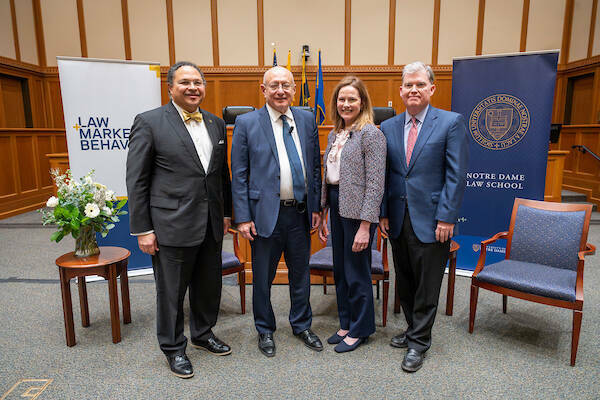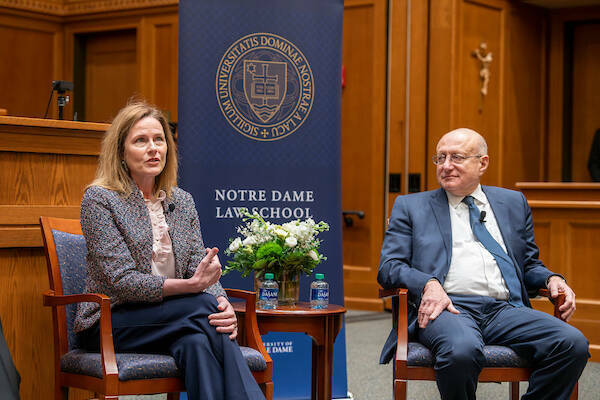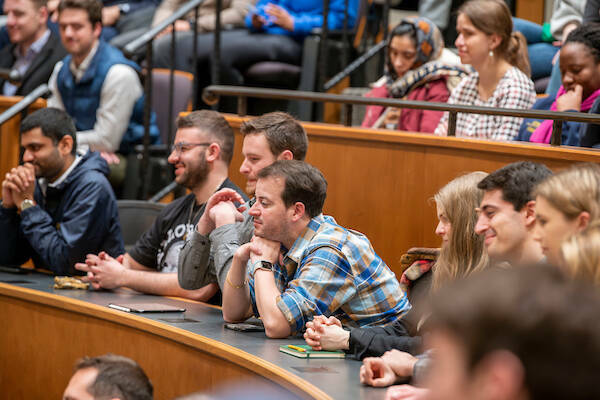U.S. Supreme Court Justice Amy Coney Barrett and Israel Supreme Court Justice Alex Stein speak at Notre Dame Law School

U.S. Supreme Court Justice Amy Coney Barrett and Israel Supreme Court Justice Alex Stein visited Notre Dame Law School on Tuesday, January 23.
In his opening remarks, G. Marcus Cole, the Joseph A. Matson Dean of Notre Dame Law School, welcomed the over 300 law school students, faculty, and staff in attendance. He expressed gratitude to the justices for their exchange of ideas, important insights, and engagement, and emphasized that Notre Dame is a place for intellectual exchange.
Justices Barrett and Stein engaged in an insightful discussion on legal interpretation within their respective legal systems that was moderated by Professor of Law William Kelley. They offered valuable insights into the processes that guide their decisions, emphasizing the significance of legal interpretation in shaping their approach to cases. As former academics and scholars, both justices have written about the challenges of legal interpretation and now actively apply these principles to address the dynamic challenges in their current roles.
Justice Stein shared his perspective on statutory and constitutional interpretation within Israeli law. According to him, courts must strictly apply the law as written, emphasizing that judges cannot alter, redefine, or substitute legislative intent when it comes to people's rights. He said that judges are exclusively accountable to the law.

He advocated for a positivist approach, urging judges to adhere to existing laws without introducing new rules. In response to the challenges presented by unclear text, he suggested a secondary rule, saying judges should take into account all pertinent evidence in order to discern both intent and the meaning of the law. He said it is important to evaluate various possibilities and choose the most probable, offering a corrective measure to traditional interpretation theories.
Justice Barrett started the discussion by emphasizing the instructive nature of comparative law for law students, highlighting the realization that nothing within the American legal system is inevitable.
She explained that her approach as an originalist in constitutional interpretation is rooted in the nature of the American Constitution as a written document undergoing a super-majoritarian process.

Barrett thinks that statutory interpretation problems come in two varieties: One is when the text is clear, but it seems to lead to a result that feels uncomfortable or that doesn't make much sense; and when the text is a little bit more open ended or doesn't expressly rule something out. She explained how the courts use substantive canons to solve these problems and their role in statutory interpretation.
Justice Barrett said her view on statutory interpretation is framed by an understanding of the judiciary's role in the U.S. system of separated powers. She compared constitutional interpretation with statutory interpretation, and acknowledged the Constitution's enduring strength, attributed to its concise nature compared to constitutions in other countries.
Watch their entire conversation here:
The conversation was arranged by Professor of Law Avishalom Tor and sponsored by Notre Dame Law School, the Notre Dame Program on Law and Market Behavior, and the Program on Law and Economics.